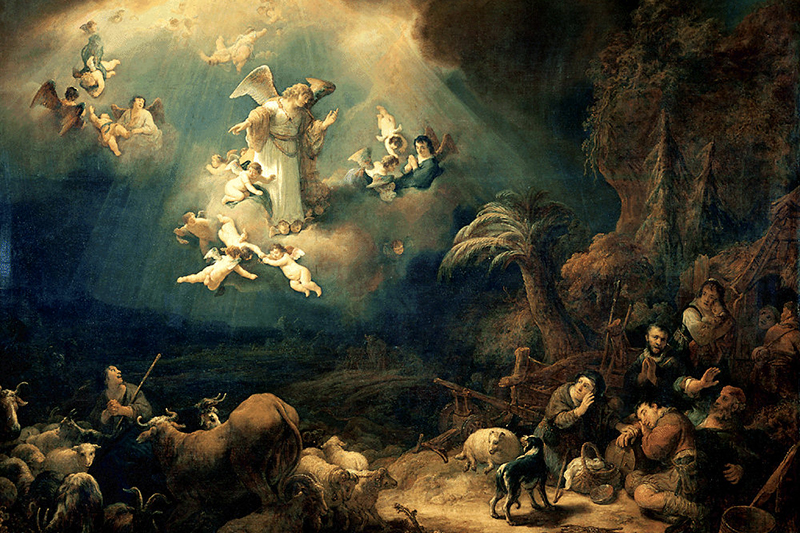
The annunciation to the shepherds, Govert Flinck: 1639.
by Timothy Quill
This past Sunday was the last in Advent, and once again immediately following the Kyrie ,the pastor went directly into the Greeting and Salutation: “The Lord be with you,” “and with your spirit.” The Gloria in Excelsis was nowhere to be found. It has been gone since the first Sunday in Advent.
When Martin Luther undertook his remarkable 1526 restoration and German translation of the Latin Mass, he did not include the ancient Gloria in Excelsis. How was it possible for someone as theologically and musically gifted as Dr. Luther to delete the Gloria? At first glance this seems a bit baffling, but a closer look reveals that the reason for the omission was most likely because the German Mass was first sung in December of 1525 which put it during the penitential season of Advent when the Gloria was not customarily sung. New compositions of the Gloria would eventually be composed by Nicolaus Decius, Luther, and others.
The Gloria is also omitted during the penitential season of Lent, but its omission is most striking during the Advent-Christmas season since it is the song of the angels to the shepherds on the night of Jesus’ birth.
Lutherans greatly value and retain the traditional liturgical practices of the church.
In the Introduction to his 1523 revision of the Latin Mass, Luther explained: “It is not now or ever has been our intention to abolish the liturgical service of God completely, but rather to purify the one that is now in use from accretions which corrupt it and to point out an evangelical use.” He commends those parts of the service added by the early church fathers and recommends they be retained in the liturgy: Psalms and Introit Psalm, Kyrie, Readings from Epistle and Gospel, Gloria in Excelsis, and so forth (LW AE 53:20-21).
In 1530, the Lutherans confessed in Article 15 of the Augsburg Confession, “We gladly keep the old traditions set up in the church because they are useful and promote tranquility, and we interpret them in an evangelical way, excluding the opinion which holds that they justify” (Ap XV, Tappert 220:38, emphasis mine).
One year after the Diet of Augsburg, Luther was preaching at St. Mary’s parish church in Wittenberg. He expressed amazement that the evangelical movement was still alive: “A year ago, at the Diet of Augsburg, the [general] opinion was that everything would go topsy-turvy within four weeks, and that all Germany would founder. [No one knew how things would end up,] or from what source help and comfort might come. The situation baffled and defied all reason and wisdom, and one was constrained to say: ‘It all depends on God’s power, and it is all staked on His Word’” (LW AE 23:400).
It is now 489 years after the Diet of Augsburg and the world in which we live—including numerous churches which bear the names “Evangelical” and “Lutheran”—are in many respects topsy-turvy, upside down, and in a state of confusion. And we too are led to express amazement and thanksgiving that after all she has gone through, the Lutheran Church has not foundered. She continues to depend on “God’s power, and it is all staked on His Word.” This is articulated on the International Lutheran Council website: “The International Lutheran Council is a growing worldwide association of established confessional Lutheran church bodies which proclaim the Gospel of Jesus Christ on the basis of an unconditional commitment to the Holy Scriptures as the inspired and infallible Word of God and to the Lutheran Confessions contained in the Book of Concord as the true and faithful exposition of the Word of God” (emphasis mine). It is extremely encouraging to know that we are not alone. Over 50 churches worldwide have chosen to be part of an association of confessional Lutheran church bodies which share this commitment to the Gospel and the Word of God.
Martin Luther retained the historic liturgy but insisted that it be in the vernacular, so that the people could understand and participate meaningfully in the Divine Service. For this reason, the Gloria in Excelsis was also composed in hymn form in order to foster congregational singing.
As Advent gives way to Christmas, ILC Churches from many countries and cultures will worship in different languages yet share in the common faith, the common Lutheran confession, and common Lutheran liturgical tradition. In the Divine Service the Lord Jesus Christ, the incarnate Word made flesh, comes to us through the Word and in his very Body and Blood in the Blessed Sacrament to bestow upon us the forgiveness of sins, life, and eternal salvation. Lutherans from all ages and throughout the world join the angels, who sang to the shepherds when Jesus was born in Bethlehem: “Glory be to God on high; and on earth peace, goodwill toward men” (Luke 2:14).
All glory be to God alone,
Forever more the highest one,
Who did our sinful race befriend
And grace and peace to us extend.
Among us may His gracious will
All hearts with deep thanksgiving fill.
– Martin Luther, All Ehr und Lob, stanza 1
———————
Rev. Dr. Timothy Quill is General Secretary of the International Lutheran Council.
